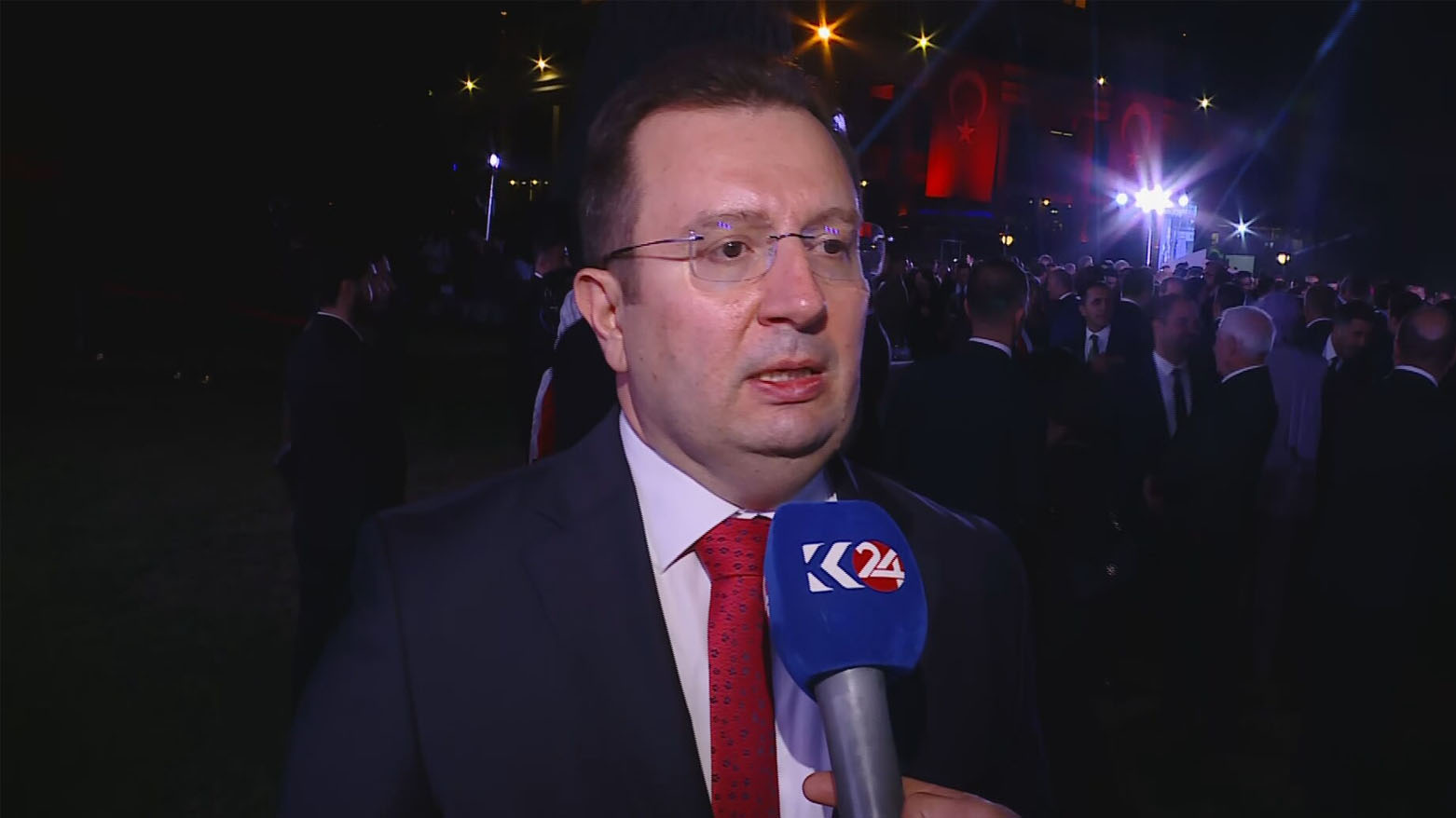Turkish Consul in Erbil: Ankara and Erbil Share a “Strong and Deep Relationship”
The Turkish Consul General in Erbil, Arman Topçu, highlighted the strong strategic ties with the Kurdistan Region, noting that trade with Iraq hits $20B annually, with 1/3 directed to the Region. This economic growth aligns with rising exports from Diyarbakır, coinciding with Türkiye's peace process

ERBIL (Kurdistan24) – The Turkish Consul General in the Kurdistan Region, Arman Topçu, affirmed the strength and depth of the Ankara–Erbil relationship, emphasizing that cooperation between the two sides continues across political, economic, and cultural fields.
Speaking to Kurdistan24 during the Republic Day reception in Erbil, Topçu underscored that relations between Ankara and the Kurdistan Region are not only longstanding but also strategic in nature.
“We have strong strategic, political, economic, and cultural relations with the people of the Kurdistan Region,” he said. “The volume of trade between Türkiye and Iraq stands at nearly 20 billion dollars, one-third of which is invested in the Kurdistan Region.”
Topçu described this as a foundation for further growth, adding: “We have a great opportunity to develop our relations even further. Our partnership has remained deep and resilient over the decades despite challenges. We are working together for peace in our region and to strengthen bilateral relations in a way that serves the interests of Iraq as a whole.”
The Consul General reaffirmed Ankara’s commitment to maintaining its engagement with the leadership of the Kurdistan Region, saying, “We will continue working with President Masoud Barzani, President Nechirvan Barzani, and Prime Minister Masrour Barzani to advance our shared interests.”
Recent trade data published by the Turkish Ministry of Trade and the Turkish Exporters’ Assembly revealed that the Kurdistan Region and Iraq remain Türkiye’s largest export destination among all neighboring countries, absorbing a combined five billion dollars worth of goods during the first half of 2025.
This figure represents more than a third of Türkiye’s total exports to all neighboring states and is more than double the value of exports to the next largest destination, Bulgaria, highlighting the exceptional significance of the Kurdish and Iraqi markets for Turkish industry and commerce.
Türkiye’s total exports to neighboring countries during this period reached 13.29 billion dollars, up by 4.8% from the same period last year. Analysts describe this growth as evidence of deepening regional interdependence and economic resilience, even amid political and security challenges.
For the Kurdistan Region, this trade relationship underscores its status as Türkiye’s key economic gateway into Iraq, serving both as a major consumer market and as a corridor for Turkish goods heading south. The scale of trade has effectively turned the Region into a strategic linchpin of Türkiye’s regional economic policy.
The ongoing peace process in Türkiye has further boosted economic cooperation, particularly between Diyarbakir in southeastern Türkiye (Northern Kurdistan) and the Kurdistan Region.
According to the Turkish Exporters’ Assembly, Diyarbakir’s exports rose sharply to 165 million dollars during the first seven months of 2025, compared to 136 million dollars in the same period last year — a 26% increase, significantly outpacing the national average growth of 3%.
Şehmus Nakaş, head of the Diyarbakir Association of Industrialists and Businessmen (DİSİDER), told Kurdistan24 that half of Diyarbakir’s total exports are destined for the Kurdistan Region. “This is a vital indicator of how political stability directly strengthens trade,” he said.
Nakaş revealed that DİSİDER had submitted a formal memorandum to parliamentary committees declaring support for the peace process, emphasizing the business community’s shared interest in sustaining reconciliation.
Entrepreneur Nurgor Mehmet Dinçoglu echoed this sentiment, telling Kurdistan24: “It is clear that achieving peace strengthens all aspects of life, including the economy. We hope all actors, large and small, support this process for a better future.”
Local business leaders have voiced optimism that a lasting solution to the Kurdish question could unlock unprecedented levels of cross-border trade. Estimates suggest that Diyarbakir’s annual exports to the Kurdistan Region could reach one billion dollars if peace efforts continue successfully. “This is an opportunity that should not be missed,” Nakaş said.
The strengthening of Türkiye–Kurdistan Region relations also coincides with President Masoud Barzani’s diplomatic efforts to support the peace process in Türkiye and promote Kurdish unity across the region.
During a meeting on July 19, 2025, in Salahaddin Resort, U.S. Acting Ambassador to Iraq Steven Fagin commended President Barzani’s role in supporting peace efforts in Türkiye and his mediation among Syrian Kurdish parties.
Fagin stressed that the United States “wants to see a strong Kurdistan Region,” noting that its stability benefits Iraq and the wider region. He praised Barzani’s contribution to advancing dialogue and reconciliation, emphasizing that the peace process “serves the interests of all parties and enhances regional stability.”
President Barzani reaffirmed his readiness to support and facilitate any steps that would ensure the success of peace efforts, describing peace in Türkiye as a shared regional interest.
The cumulative effect of these developments — growing trade, political dialogue, and mutual recognition of shared interests — underscores the strategic depth of Ankara–Erbil relations.
While Türkiye continues to play a central role in the Kurdistan Region’s economy, Erbil’s stability and openness provide Ankara with a reliable partner in an otherwise volatile region. The synergy between the peace process in Türkiye and expanding trade through the Kurdistan Region illustrates how political reconciliation can drive economic prosperity.
As Consul General Topçu put it: “Our relationship with the Kurdistan Region is not merely diplomatic — it is historical, cultural, and rooted in mutual benefit. Together, we can continue to build a peaceful and prosperous region.”